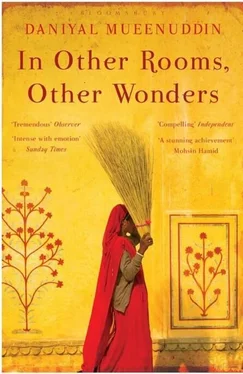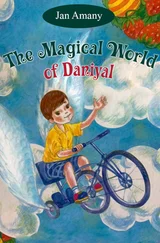‘In any case we need to sell. Have them prepare powers of attorney so that you can arrange the transfers.’
They spoke for a few minutes about a murder recently committed by one of the tenants, a matter of a girl. Jaglani knew to do this, in order to paper over the embarrassment his master must feel at having to sell land held by his family for three generations.
Walking out under the cool white verandah of Gulfishan, the name by which Lahore knew the great house, Jaglani reflected, Well, there’s plenty of it. He can sell for thirty years and he’ll still have a farm.
The chauffeur, Mustafa, stood by the car. Seeing Jaglani coming, he flicked away his cigarette and went around to open the door. A short man with a chipped tooth, a small, careful mustache, and wavy hair, Mustafa had earned Jaglani’s confidence by his discretion and by his excellent qualities as a courtier. Although they spoke frankly and easily on the long drives to Lahore, Mustafa became mute in the presence of others, stone-faced as a chauffeur should be.
Getting into the car, Jaglani said, ‘Well, now the game heats up.’
‘Good news?’ asked Mustafa.
‘Not bad, not too bad.’
Accustomed to having almost unlimited amounts of money, K. K. Harouni began selling blocks of land, sold it with the sugarcane still standing, the hundred-year-old rosewood trees on the borders of each field thrown in for nothing. Jaglani would receive a brief telegram, need fifty thousand immediately, and he would sell the land at half price, the choice pieces to himself, putting it in the names of his servants and relatives. He sold to the other managers, to his friends, to political allies. Everyone got a piece of the quick dispersion. He took a commission on each sale. He became ever more powerful and rich.
Harouni’s children, seeing their inheritance bleeding away, said to their father, ‘Jaglani’s fleecing you. He’s a thief. You should cut down your expenses. If you must sell, for God’s sake sell at a proper price.’
‘If I believed that Jaglani had cheated me,’ said the father, ‘I wouldn’t believe in anything anymore.’
The old man sentimentally thought that the people of Dunyapur, the village in the heart of the Harouni lands, revered his family, whose roots had been in that soil for a mere hundred years.
Though he had become crooked on a large scale, Jaglani did not believe himself to have broken his feudal allegiance to K. K. Harouni, but instead felt himself appropriately to be taking advantage of the master’s incapacity and lack of oversight, not seceding but simply expressing a more independent stance. He continued to run the farm extremely well and profitably, and continued sending money to Lahore, a larger share of the net in fact than he used to send, because he himself had developed other sources of income. As his political ambitions grew, he moved his family and household from the village to a large but plain house in the small city of Firoza, the subdistrict headquarters, in order to be closer to the courts and to the government administration. He kept his house in Dunyapur, and often spent nights there. An old sweepress cleaned the house, and he ate the food prepared in the dera, the administrative center, where many visitors, buyers and sellers, came and were fed and housed.
One spring day, while driving Jaglani from Firoza to Dunyapur, among the rising green sugarcane fields, with migratory quail and the partridge calling, Mustafa the driver, sensing his master’s good mood, begged to speak.
‘That’s fine, go on,’ said Jaglani, who knew that the driver had chosen this moment to make some request. Mustafa rarely asked for anything on his own behalf, but often acted for other people who needed something from his master. He advanced carefully, asking only at the correct moment, when he knew Jaglani would accede; and Jaglani, who often sounded his ideas on Mustafa, did not mind this slight bit of manipulation. His own career had been built on calculations of give-and-take. Mustafa took care to make requests that reflected Jaglani’s interests, or at least that would not harm his interests.
‘My sister,’ said Mustafa, ‘just fled back from Rawalpindi, leaving her husband there. He works in ’Pindi as a peon in a bank. You were good enough to get him that post. She couldn’t stand the city, the dirtiness, the bad food, the lack of friends or family. Her husband doesn’t send any money, because he wants to starve her out and force her back to his home. You often have said that the food they prepare for visitors doesn’t suit you. Viro, who cleans your house, is getting old. Let my sister cook for you and keep the house. Let her try for a week or two. If she doesn’t do well, then please let her go. I beg pardon for troubling you with this.’
Mustafa always managed to ask favors in a way that made Jaglani glow, choosing moments when his master felt satis fied, with work or with politics, the moment when the day seemed sweetest.
‘That’s fine,’ said Jaglani tersely, not wanting to show his pleasure at obliging his driver in this almost personal fashion. ‘Tell the accountants to put her on salary, and put the old woman wherever they will.’
The next evening Jaglani returned to Dunyapur at dusk, after a day spent on the farms, the jeep’s twin lights poking into the night. Peasants bringing their buffalos back from watering at the canal stood aside and saluted, the heavy bells hanging from the animals’ necks making a mournful hollow gonging. Some had old shoes tied around their necks, as amulets against the evil eye. Only Jaglani’s house had electricity, and as they drove along the dusty main street of the village, lanterns glowed in the unshuttered windows and cook fires threw orange light on the mud walls. The village smelled of dung and dust and smoke and of the mango blossoms in the surrounding orchard.
Entering his house through a side door, Jaglani saw a woman crouched over the hearth in the courtyard lit by a single bare bulb, cooking parathas in clarified butter. She looked back at him and then covered her head, turning her face away.
‘ Salaam, Chaudrey Sahib,’ she said.
‘ Salaam, Bibi.’
He went into the whitewashed brick house, the rooms overcrowded with ugly carved wood furniture. In his bedroom he took off the revolver that he always wore under his kurta and hung it on a hook, then washed his hands and face at a sink in the bedroom and said his prayers.
Returning to the courtyard, he sat down on a charpoy and put his feet up. She had already lit his hookah, and he began to smoke.
‘How long have you been back in Dunyapur?’ he asked.
‘Two months.’
‘Are you staying with Mustafa?’
‘Yes, he took me in.’
‘What’s your name?’
‘Zainab.’
When she brought the food, four or five small dishes of curry on a steel tray, with the parathas in a woven reed basket covered with a napkin, he looked up at her suddenly, wanting to find out what kind of woman she might be.
Slowly looking down, she avoided his eyes. She had a hard pale face, angular, with high cheekbones, almost beautiful, but too forceful, reminding him of a woman who had been caught years ago on the banks of the Indus, a cattle thief. No woman had ever before been known to lift cattle, and people came from miles around to see her, sitting defiantly on a charpoy in the dera, waiting to be turned over to the police.
As Jaglani finished eating, Zainab slipped away. The food could not have been better. Smoking the hookah and listening to the village going to sleep, the last few voices, the animals bedded down, he decided he would keep her on.
In late March the wheat harvest began, and Jaglani moved to the village, as he did each year, in order to observe the weighing of the crop as it came in. That winter he had planted seven hundred acres of wheat, and now he hired the villagers to cut it by hand, moving across the yellow fields and setting up the cut bundles into shocks, women and men working together. Their babies swung in cloths strung in the shade between trees, and the tractors pulled steel wagons, which bumped over the field rows and gradually filled with the loose sheaves thrown up by the men. The threshing machines ran all day and night, powered by tractors which idled or roared as they ran light or had to bear a load, when the man on the wagon threw a big armful of wheat into the hopper. The chaff, blown out to one side, would grow into enormous golden piles, until finally the men would uncouple the tractor and move the thresher to another spot. Jaglani sat much of the day in the dera, on a charpoy under a massive banyan tree, smoking a hookah and watching the trolleys come in. Two men would pull the burlap sacks down from the trolley along a wooden ramp, each holding one corner, dragging them over to the balance scales that hung from a far branch of the banyan. An accountant entered the weight of each sack into a ledger, and then the two men threw the wheat atop a growing pile, which they climbed, their bare feet digging into the hot grain, sinking to their knees, until they reached the top and upended the sack.
Читать дальше












